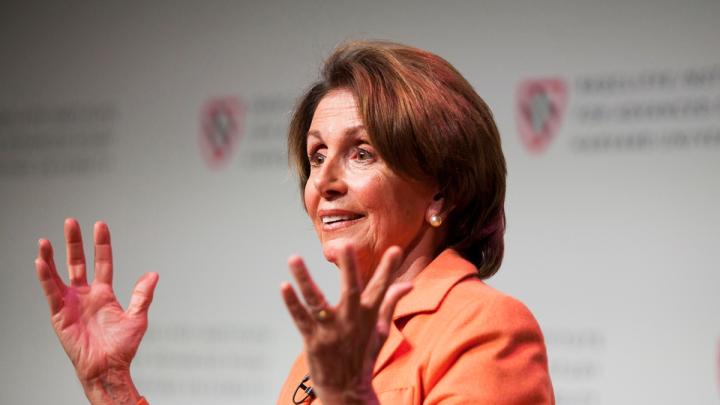Nancy Pelosi’s very first meeting at the White House after she became the first woman chosen Speaker of the House of Representatives, in the 110th Congress, was unlike any other meeting she had ever been to before. In fact, it was unlike any meeting any woman had ever been to at the White House before, Pelosi said during a conversation today at the Radcliffe Institute for Advanced Study. She was in Cambridge to help celebrate the fiftieth anniversary of the release in 1963 of the official report of the first Presidential Commission on the Status of Women, established by President John F. Kennedy two years earlier to advise him on issues concerning the status of women in education and the workplace.
“I was sitting in the chair and I felt very closed in,” Pelosi reported. “All of a sudden I realized that Susan B. Anthony, Lucretia Mott, Elizabeth Cady Stanton…they were all on that chair with me, and I swear I could hear them say, ‘At last we have a seat at the table.’”
In a candid and lively conversation with Ellen Fitzpatrick, Carpenter professor of history at the University of New Hampshire, Pelosi discussed topics ranging from the thrill of being at Kennedy’s inauguration to the importance of raising the minimum wage, of family and work balance, and of affordable, quality childcare in order to enable women to work outside the home.
Pelosi, who has led House Democrats for a decade and has represented her San Francisco district for 26 years, also discussed growing up in a political household: her late father, Thomas D'Alesandro Jr., served as mayor of Baltimore for 12 years after representing the city for five terms in Congress. One night when her mother was not feeling well, the teenaged Pelosi attended a political dinner with her father and ended up sitting next to John F. Kennedy, a congressman at the time. She called attending his inauguration years later the pinnacle of her political and public service involvement. “I was sitting there in the freezing cold being inspired,” she said. “He inspired generations in a very special way.”
Fitzpatrick noted that the anniversary celebration was bittersweet, because many of the issues raised a half-century ago, particularly economic inequality, are still relevant today. She then asked Pelosi what could be done to close this gap in the next 50 years.
“We need to have an economic agenda for women and families,” Pelosi replied. “When women succeed, America succeeds. Pay equity, raising the minimum wage, and paid sick leave are important. The Family and Medical Leave Act is a great thing, but it is unpaid leave, and…many people…just can’t afford to take a day off.” A mother of five and a grandmother of nine, Pelosi also stressed what she feels is essential for women to succeed in the workplace: affordable, quality childcare, which will “unleash the power of women and families in a very important way.”
At the end of the formal program, several students asked Pelosi questions on topics ranging from her work on legislation to help stop violence against women to what it is like to be the first Italian-American woman to lead a major political party in Congress.
“I know why it took a long time to have a woman Speaker, because I never thought there would be a woman Speaker,” Pelosi said. “I never set out to run for Congress but I was ready. That is my message to all of you: you never know what will come next. Just be ready.”
In 1961 President John F. Kennedy established a presidential commission to examine and report on the status of American women. The President's Commission on the Status of Women, chaired by Eleanor Roosevelt from its beginning until her death in 1962, published its report about women in the workplace, in education, and under the law in October 1963. The John F. Kennedy Presidential Library and Museum and the Radcliffe Institute for Advanced Study at Harvard University are partnering to mark this important historical milestone and to reflect on the status of American women 50 years later.
For more, see Radcliffe's event page for Pelosi's visit.








